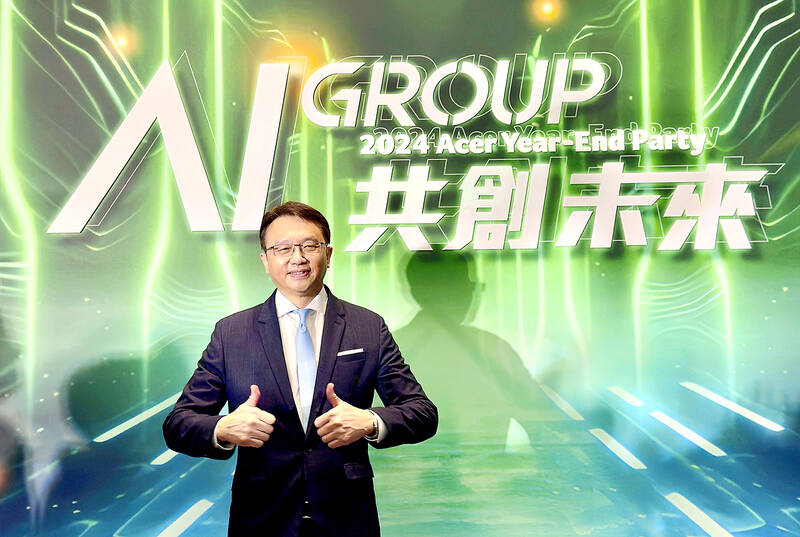PC brand Acer Inc (宏碁) plans to raise the price of products made in China and sold to the US by 10 percent in response to US President Donald Trump hiking tariffs on imports from China.
Acer said on Monday that the planned 10 percent will be a default price increase based on Trump’s tariff hike, confirming a report in the Daily Telegraph over the weekend citing chairman Jason Chen (陳俊聖).
In the Daily Telegraph report, Chen said products shipped before the 10 percent tariff took effect on Feb. 4 will not be affected so the price hike will take place in the coming weeks.

Photo: Fang Wei-chieh, Taipei Times
“We will have to adjust the end user price to reflect the tariff,” Chen said in the report. “We think 10 percent will be the default price increase because of the import tax. It’s very straightforward.”
The report said Acer’s most expensive laptops cost up to US$3,700 in the US market, so the price hike is expected to increase the price American consumers have to pay by hundreds of dollars.
According to market information advisory firm Gartner Inc, Acer was the fifth-largest PC vendor in the US market in the fourth quarter of last year with a 5.8 percent share, trailing US-based HP Inc with 26.1 percent, Dell Inc with 21.8 percent, China’s Lenovo Group Ltd (聯想) with 17.2 percent and Apple Inc with 14.9 percent.
Asustek Computer Inc (華碩), another Taiwanese PC vendor, took the sixth spot with a 5.2 percent share of the US market in the fourth quarter, Gartner said.
The Daily Telegraph said almost 80 percent of notebook computers shipped to the US market are made in China.
Chen also told the Daily Telegraph that Acer is considering the possibility of different supply chains outside China, and production in the US market is one of the options.
The report echoed remarks made by Chen when he spoke with Taiwanese news media on Feb. 3 that amid Trump’s tariff actions, a PC brand, like Acer, has to choose a supply chain that benefits the company most by taking into consideration a range of factors, including production costs and logistics expenses, to make the most favorable choice.

TAKING STOCK: A Taiwanese cookware firm in Vietnam urged customers to assess inventory or place orders early so shipments can reach the US while tariffs are paused Taiwanese businesses in Vietnam are exploring alternatives after the White House imposed a 46 percent import duty on Vietnamese goods, following US President Donald Trump’s announcement of “reciprocal” tariffs on the US’ trading partners. Lo Shih-liang (羅世良), chairman of Brico Industry Co (裕茂工業), a Taiwanese company that manufactures cast iron cookware and stove components in Vietnam, said that more than 40 percent of his business was tied to the US market, describing the constant US policy shifts as an emotional roller coaster. “I work during the day and stay up all night watching the news. I’ve been following US news until 3am

UNCERTAINTY: Innolux activated a stringent supply chain management mechanism, as it did during the COVID-19 pandemic, to ensure optimal inventory levels for customers Flat-panel display makers AUO Corp (友達) and Innolux Corp (群創) yesterday said that about 12 to 20 percent of their display business is at risk of potential US tariffs and that they would relocate production or shipment destinations to mitigate the levies’ effects. US tariffs would have a direct impact of US$200 million on AUO’s revenue, company chairman Paul Peng (彭雙浪) told reporters on the sidelines of the Touch Taiwan trade show in Taipei yesterday. That would make up about 12 percent of the company’s overall revenue. To cope with the tariff uncertainty, AUO plans to allocate its production to manufacturing facilities in

Six years ago, LVMH’s billionaire CEO Bernard Arnault and US President Donald Trump cut the blue ribbon on a factory in rural Texas that would make designer handbags for Louis Vuitton, one of the world’s best-known luxury brands. However, since the high-profile opening, the factory has faced a host of problems limiting production, 11 former Louis Vuitton employees said. The site has consistently ranked among the worst-performing for Louis Vuitton globally, “significantly” underperforming other facilities, said three former Louis Vuitton workers and a senior industry source, who cited internal rankings shared with staff. The plant’s problems — which have not

COLLABORATION: Given Taiwan’s key position in global supply chains, the US firm is discussing strategies with local partners and clients to deal with global uncertainties Advanced Micro Devices Inc (AMD) yesterday said it is meeting with local ecosystem partners, including Taiwan Semiconductor Manufacturing Co (TSMC, 台積電), to discuss strategies, including long-term manufacturing, to navigate uncertainties such as US tariffs, as Taiwan occupies an important position in global supply chains. AMD chief executive officer Lisa Su (蘇姿丰) told reporters that Taiwan is an important part of the chip designer’s ecosystem and she is discussing with partners and customers in Taiwan to forge strong collaborations on different areas during this critical period. AMD has just become the first artificial-intelligence (AI) server chip customer of TSMC to utilize its advanced